计网实验TCPIPConfiguration
实训(2)Windows环境下TCP/IP协议的配置,TCP/IP诊断
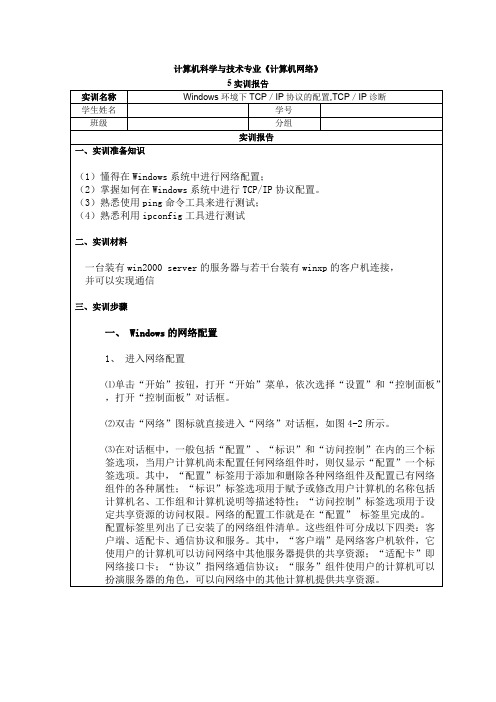
计算机科学与技术专业《计算机网络》5实训报告实训名称Windows环境下TCP/IP协议的配置,TCP/IP诊断学生姓名学号班级分组实训报告一、实训准备知识(1)懂得在Windows系统中进行网络配置;(2)掌握如何在Windows系统中进行TCP/IP协议配置。
(3)熟悉使用ping命令工具来进行测试;(4)熟悉利用ipconfig工具进行测试二、实训材料一台装有win2000 server的服务器与若干台装有winxp的客户机连接,并可以实现通信三、实训步骤一、 Windows的网络配置1、进入网络配置⑴单击“开始”按钮,打开“开始”菜单,依次选择“设置”和“控制面板”,打开“控制面板”对话框。
⑵双击“网络”图标就直接进入“网络”对话框,如图4-2所示。
⑶在对话框中,一般包括“配置”、“标识”和“访问控制”在内的三个标签选项,当用户计算机尚未配置任何网络组件时,则仅显示“配置”一个标签选项。
其中,“配置”标签用于添加和删除各种网络组件及配置已有网络组件的各种属性;“标识”标签选项用于赋予或修改用户计算机的名称包括计算机名、工作组和计算机说明等描述特性;“访问控制”标签选项用于设定共享资源的访问权限。
网络的配置工作就是在“配置” 标签里完成的。
配置标签里列出了已安装了的网络组件清单。
这些组件可分成以下四类:客户端、适配卡、通信协议和服务。
其中,“客户端”是网络客户机软件,它使用户的计算机可以访问网络中其他服务器提供的共享资源;“适配卡”即网络接口卡;“协议”指网络通信协议;“服务”组件使用户的计算机可以扮演服务器的角色,可以向网络中的其他计算机提供共享资源。
3、添加客户组件并设定属性⑴在“配置”标签中单击“添加”按钮,选择“客户”组件类型,然后单击“确定”,或双击“客户”组件类型即可进入如图4-3所示的“选定网络客户”对话框。
对话框的左边是网络厂商,右边是由厂商提供的网络客户组件,选择所需按确定即可。
网络组建 实验指导-显示当前的TCP IP配置
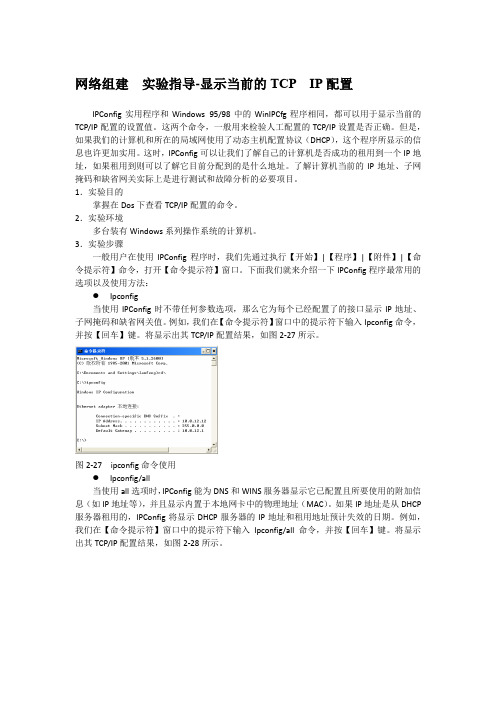
网络组建实验指导-显示当前的TCP IP配置IPConfig实用程序和Windows 95/98中的WinIPCfg程序相同,都可以用于显示当前的TCP/IP配置的设置值。
这两个命令,一般用来检验人工配置的TCP/IP设置是否正确。
但是,如果我们的计算机和所在的局域网使用了动态主机配置协议(DHCP),这个程序所显示的信息也许更加实用。
这时,IPConfig可以让我们了解自己的计算机是否成功的租用到一个IP地址,如果租用到则可以了解它目前分配到的是什么地址。
了解计算机当前的IP地址、子网掩码和缺省网关实际上是进行测试和故障分析的必要项目。
1.实验目的掌握在Dos下查看TCP/IP配置的命令。
2.实验环境多台装有Windows系列操作系统的计算机。
3.实验步骤一般用户在使用IPConfig程序时,我们先通过执行【开始】|【程序】|【附件】|【命令提示符】命令,打开【命令提示符】窗口。
下面我们就来介绍一下IPConfig程序最常用的选项以及使用方法:●Ipconfig当使用IPConfig时不带任何参数选项,那么它为每个已经配置了的接口显示IP地址、子网掩码和缺省网关值。
例如,我们在【命令提示符】窗口中的提示符下输入Ipconfig命令,并按【回车】键。
将显示出其TCP/IP配置结果,如图2-27所示。
图2-27 ipconfig命令使用●Ipconfig/allall选项时,IPConfig能为DNS和WINS服务器显示它已配置且所要使用的附加信息(如IP地址等),并且显示内置于本地网卡中的物理地址(MAC)。
如果IP地址是从DHCP 服务器租用的,IPConfig将显示DHCP服务器的IP地址和租用地址预计失效的日期。
例如,我们在【命令提示符】窗口中的提示符下输入Ipconfig/all命令,并按【回车】键。
将显示出其TCP/IP配置结果,如图2-28所示。
图2-28 Ipconfig/all命令使用Ipconfig/release和Ipconfig/renewDHCP服务器租用其IP地址的计算机上起作用。
实验四TCPIP协议属性设置报告
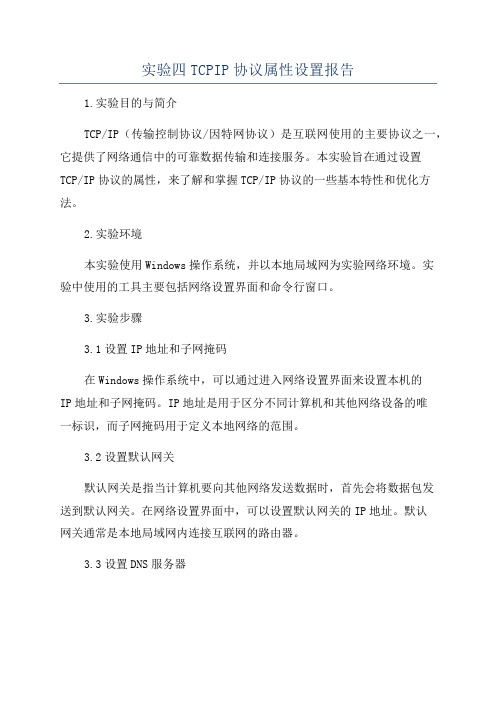
实验四TCPIP协议属性设置报告1.实验目的与简介TCP/IP(传输控制协议/因特网协议)是互联网使用的主要协议之一,它提供了网络通信中的可靠数据传输和连接服务。
本实验旨在通过设置TCP/IP协议的属性,来了解和掌握TCP/IP协议的一些基本特性和优化方法。
2.实验环境本实验使用Windows操作系统,并以本地局域网为实验网络环境。
实验中使用的工具主要包括网络设置界面和命令行窗口。
3.实验步骤3.1设置IP地址和子网掩码在Windows操作系统中,可以通过进入网络设置界面来设置本机的IP地址和子网掩码。
IP地址是用于区分不同计算机和其他网络设备的唯一标识,而子网掩码用于定义本地网络的范围。
3.2设置默认网关默认网关是指当计算机要向其他网络发送数据时,首先会将数据包发送到默认网关。
在网络设置界面中,可以设置默认网关的IP地址。
默认网关通常是本地局域网内连接互联网的路由器。
3.3设置DNS服务器DNS(域名系统)服务器用于将域名转换为对应的IP地址。
在网络设置界面中,可以设置DNS服务器的IP地址。
一般来说,可以使用本地路由器或者互联网服务提供商提供的DNS服务器。
3.4设置TCP/IP属性通过命令行窗口可以使用"ipconfig"命令查看当前TCP/IP属性的详细信息。
可以通过命令行窗口中的一系列命令来设置TCP/IP属性,例如设置TCP缓冲区大小、调整TCP拥塞控制算法等等。
3.5实验结果与分析设置完TCP/IP属性后,可以使用一些网络性能测试工具来评估网络连接的质量和性能。
例如可以使用Ping命令检测网络延迟和丢包率,使用速度测试工具来测试网络带宽等等。
4.实验总结与心得TCP/IP协议是互联网中最常用的通信协议之一,对于网络通信的质量和性能具有重要影响。
通过实验,我了解到TCP/IP协议的一些基本特性和连接调优方法,并且掌握了调整TCP/IP属性的操作方法。
在实验过程中,我发现通过调整TCP缓冲区大小可以提高TCP连接的传输速度,并且可以通过调整TCP的拥塞控制算法来改善网络拥塞时的传输性能。
网络实验 TCP-IP配置
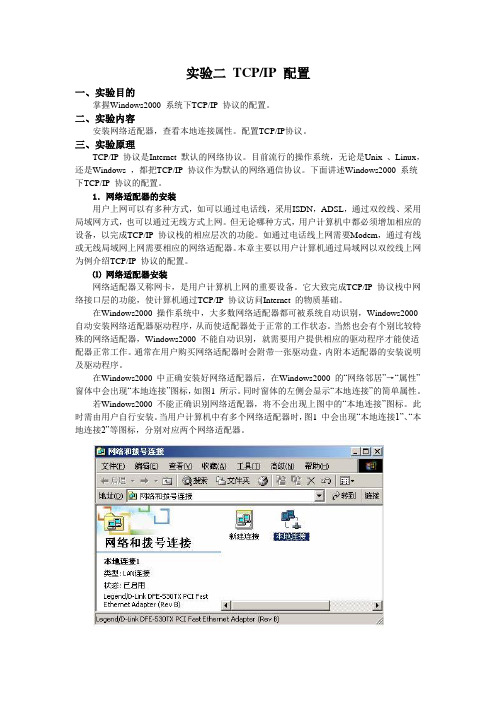
实验二TCP/IP 配置一、实验目的掌握Windows2000 系统下TCP/IP 协议的配置。
二、实验内容安装网络适配器,查看本地连接属性。
配置TCP/IP协议。
三、实验原理TCP/IP 协议是Internet 默认的网络协议。
目前流行的操作系统,无论是Unix 、Linux,还是Windows ,都把TCP/IP 协议作为默认的网络通信协议。
下面讲述Windows2000 系统下TCP/IP 协议的配置。
1.网络适配器的安装用户上网可以有多种方式,如可以通过电话线,采用ISDN,ADSL,通过双绞线、采用局域网方式,也可以通过无线方式上网。
但无论哪种方式,用户计算机中都必须增加相应的设备,以完成TCP/IP 协议栈的相应层次的功能。
如通过电话线上网需要Modem,通过有线或无线局域网上网需要相应的网络适配器。
本章主要以用户计算机通过局域网以双绞线上网为例介绍TCP/IP 协议的配置。
⑴网络适配器安装网络适配器又称网卡,是用户计算机上网的重要设备。
它大致完成TCP/IP 协议栈中网络接口层的功能,使计算机通过TCP/IP 协议访问Internet 的物质基础。
在Windows2000 操作系统中,大多数网络适配器都可被系统自动识别,Windows2000 自动安装网络适配器驱动程序,从而使适配器处于正常的工作状态。
当然也会有个别比较特殊的网络适配器,Windows2000 不能自动识别,就需要用户提供相应的驱动程序才能使适配器正常工作。
通常在用户购买网络适配器时会附带一张驱动盘,内附本适配器的安装说明及驱动程序。
在Windows2000 中正确安装好网络适配器后,在Windows2000 的“网络邻居”→“属性”窗体中会出现“本地连接”图标,如图1 所示。
同时窗体的左侧会显示“本地连接”的简单属性。
若Windows2000 不能正确识别网络适配器,将不会出现上图中的“本地连接”图标。
此时需由用户自行安装。
实验一常用网络命令的使用与TCPIP协议配置
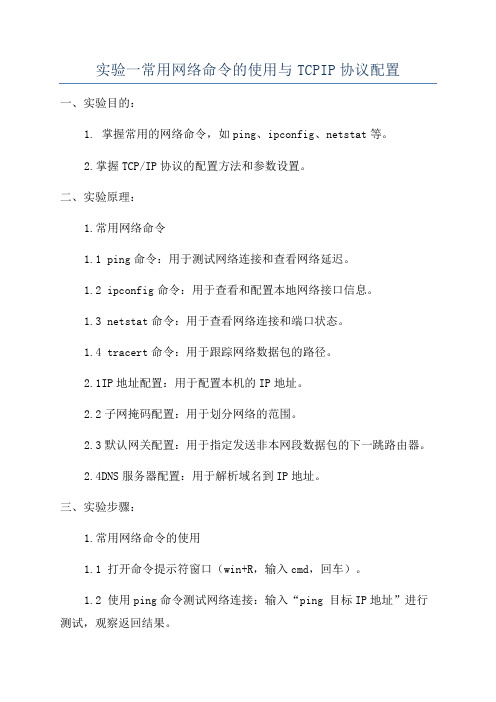
实验一常用网络命令的使用与TCPIP协议配置一、实验目的:1. 掌握常用的网络命令,如ping、ipconfig、netstat等。
2.掌握TCP/IP协议的配置方法和参数设置。
二、实验原理:1.常用网络命令1.1 ping命令:用于测试网络连接和查看网络延迟。
1.2 ipconfig命令:用于查看和配置本地网络接口信息。
1.3 netstat命令:用于查看网络连接和端口状态。
1.4 tracert命令:用于跟踪网络数据包的路径。
2.1IP地址配置:用于配置本机的IP地址。
2.2子网掩码配置:用于划分网络的范围。
2.3默认网关配置:用于指定发送非本网段数据包的下一跳路由器。
2.4DNS服务器配置:用于解析域名到IP地址。
三、实验步骤:1.常用网络命令的使用1.1 打开命令提示符窗口(win+R,输入cmd,回车)。
1.2 使用ping命令测试网络连接:输入“ping 目标IP地址”进行测试,观察返回结果。
1.3 使用ipconfig命令查看本机网络接口信息:输入“ipconfig”,查看IP地址、子网掩码、默认网关等信息。
1.4 使用netstat命令查看网络连接和端口状态:输入“netstat -a”,查看当前所有的连接和端口状态。
2.1 配置IP地址:输入“netsh interface ip set address name=本地连接 static IP地址子网掩码默认网关”,其中“本地连接”为网卡名称,可通过ipconfig命令查看。
2.2 配置子网掩码:输入“netsh interface ip set address name=本地连接 source=static addr=IP地址 mask=子网掩码”,其中“本地连接”为网卡名称,“IP地址”为设定的IP地址,“子网掩码”为设定的子网掩码。
2.3 配置默认网关:输入“netsh interface ip set address name=本地连接 gateway=默认网关”,其中“本地连接”为网卡名称,“默认网关”为设定的默认网关。
实验一TCPIP配置与测试
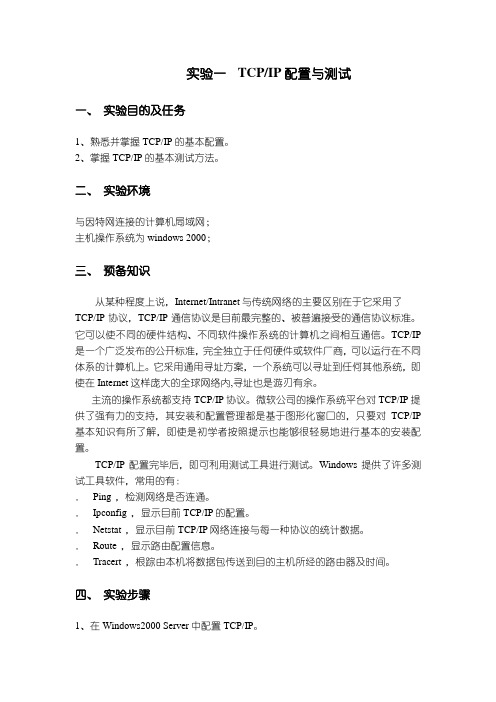
实验一TCP/IP配置与测试一、实验目的及任务1、熟悉并掌握TCP/IP的基本配置。
2、掌握TCP/IP的基本测试方法。
二、实验环境与因特网连接的计算机局域网;主机操作系统为windows 2000;三、预备知识从某种程度上说,Internet/Intranet与传统网络的主要区别在于它采用了TCP/IP协议,TCP/IP通信协议是目前最完整的、被普遍接受的通信协议标准。
它可以使不同的硬件结构、不同软件操作系统的计算机之间相互通信。
TCP/IP 是一个广泛发布的公开标准,完全独立于任何硬件或软件厂商,可以运行在不同体系的计算机上。
它采用通用寻址方案,一个系统可以寻址到任何其他系统,即使在Internet这样庞大的全球网络内,寻址也是游刃有余。
主流的操作系统都支持TCP/IP协议。
微软公司的操作系统平台对TCP/IP提供了强有力的支持,其安装和配置管理都是基于图形化窗口的,只要对TCP/IP 基本知识有所了解,即使是初学者按照提示也能够很轻易地进行基本的安装配置。
TCP/IP配置完毕后,即可利用测试工具进行测试。
Windows提供了许多测试工具软件,常用的有:.Ping ,检测网络是否连通。
.Ipconfig ,显示目前TCP/IP的配置。
.Netstat ,显示目前TCP/IP网络连接与每一种协议的统计数据。
.Route ,显示路由配置信息。
.Tracert ,根踪由本机将数据包传送到目的主机所经的路由器及时间。
四、实验步骤1、在Windows2000 Server中配置TCP/IP。
(1)选择[开始]>[设置]>[控制面板]>[网络和拨号连接],打开网络和拨号连接对话框。
(2)选择[本地连接],单击鼠标右键,从弹出的快捷菜单中选择[属性]、从组件列表中选择[1nternet协议(TCP/IP)] ,单击[属性]按钮打开如图所示的对话框。
图[Internet协议(TCP/IP)属性]对话框(3)选择1P地址分配方式,这里有两种情况:如果要通过动态分配的方式获取IP地址,请选择[自动获得IP地址选项] 。
《计算机网络》实验一TCP和IP配置与测试
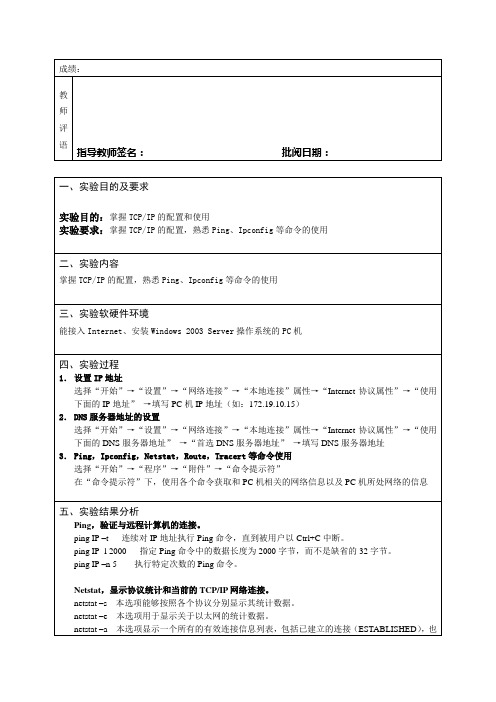
教师评语
指导教师签名: 批阅日期:
一、实验目的及要求
实验目的:掌握TCP/IP的配置和使用
实验要求:掌握TCP/IP的配置,熟悉Ping、Ipconfig等命令的使用
二、实验内容
掌握TCP/IP的配置,熟悉Ping、Ipconfig等命令的使用
三、实验软硬件环境
能接入Internet、安装Windows 2003 Server操作系统的PC机
3.Ping,Ipconfig,Netstat,Route,Tracert等命令使用
选择“开始”→“程序”→“附件”→“命令提示符”
在“命令提示符”下,使用各个命令获取和PC机相关的网络信息以及PC机所处网络的信息
五、实验结果分析
Ping,验证与远程计算机的连接。
ping IP –t连续对IP地址执行Ping命令,直到被用户以Ctrl+C中断。
ipconfig /release和ipconfig /renew--这是两个附加选项,只能在向DHCP服务器租用其IP地址的计算机上起作用。
Route,控制网络路由表。
route print本命令用于显示路由表中的当前项目
Tracert,是路由跟踪实用程序,用于确定IP数据报访问目标所采取的路径。Tracert命令用IP生存时间(TTL)字段和ICMP错误消息来确定从一个主机到网络上其他主机的路由。
四、实验过程
1.设置IP地址
选择“开始”→“设置”→“网络连接”→“本地连接”属性→“Internet协议属性”→“使用下面的IP地址”→填写PC机IP地址(如:172.19.10.15)
2.DNS服务器地址的设置
选择“开始”→“设置”→“网络连接”→“本地连接”属性→“Internet协议属性”→“使用下面的DNS服务器地址”-j host-list指定Tracert实用程序数据包所采用路径中的路由器接口列表。
实验二--配置TCPIP协议

实验二--配置T C P I P协议本页仅作为文档页封面,使用时可以删除This document is for reference only-rar21year.March实验二配置TCP/IP协议一、实验目的了解TCP/IP协议的工作原理;掌握TCP/IP协议的安装及配置方法;掌握常用的TCP/IP网络故障诊断和排除方法;二、实验环境多台装有Windows 2008 Server的计算机。
三、实验内容及步骤1、安装TCP/IP协议控制面板—>网络连接—>本地连接—>右键调出属性面板—>添加—>协议—>选择TCP/IP协议—>开始安装2、设置TCP/IP协议右击网上邻居—>属性—>右击本地连接—>属性—>选择TCP/IP协议—>属性●设置IP地址:192.168.0.机器号+10●设置子网掩码:255.255.255.0●设置默认网关:192.168.0.1●设置DNS服务器:192.168.0.13、常用网络测试命令的使用(1)PingPing是测试网络联接状况以及信息包发送和接收状况非常有用的工具,是网络测试最常用的命令。
Ping向目标主机(地址)发送一个回送请求数据包,要求目标主机收到请求后给予答复,从而判断网络的响应时间和本机是否与目标主机(地址)联通。
如果执行Ping不成功,则可以预测故障出现在以下几个方面:网线故障,网络适配器配置不正确,IP地址不正确。
如果执行Ping成功而网络仍无法使用,那么问题很可能出在网络系统的软件配置方面,Ping成功只能保证本机与目标主机间存在一条连通的物理路径。
命令格式:参数含义:-t不停地向目标主机发送数据;直到用户按ctrl+c结束-a 以IP地址格式来显示目标主机的网络地址;-n count 指定要Ping多少次,具体次数由count来指定;-l size 指定发送到目标主机的数据包的大小。
- 1、下载文档前请自行甄别文档内容的完整性,平台不提供额外的编辑、内容补充、找答案等附加服务。
- 2、"仅部分预览"的文档,不可在线预览部分如存在完整性等问题,可反馈申请退款(可完整预览的文档不适用该条件!)。
- 3、如文档侵犯您的权益,请联系客服反馈,我们会尽快为您处理(人工客服工作时间:9:00-18:30)。
Test 1. TCP/IP Configuration1. Click Start and then click Run. Type the command or cmd and then press Enter.2. At the DOS prompt, type NET HELP and press Enter. You should see something like the screen below:The command you are interested in is the View command. To obtain information about it, type NET HELP VIEW, and press Enter.3. What is the purpose of NET VIEW:The NET VIEW command shows the names of the machines present on your network. Notice that it lists the names of machines on the left, incolumn labelled “Server name”and another column labelled “Remark”4. List the machines after you have typed NET VIEW from the command promptClose the DOS window by typing EXIT on the command line and then press Enter, or by clicking the Close button in the upper right corner of the window.Obtain the TCP/IP Configuration InformationUse the Start menu to open the Command Prompt, an MS-DOS-like window. Press Start > Programs > Accessories > Command Prompt or Start > Programs > Command Prompt.The following figure shows the Command screen. Type ipconfig and press the Enter key. The spelling of ipconfig is critical while case is not. It is short for IP Configuration.This first screen shows the IP address, subnet mask, and default gateway. The IP address and the default gateway should be in the same network or subnet, otherwise this host would not be able to communicateoutside the network. In the figure the subnet mask tells us that the first three octets must be the same to be in the same network.Note: If this computer is on a LAN, the default gateway might not be seen if it is running behind a Proxy Server. Record the following information for this computer.Record the following TCP/IP information for this computer6.Compare the TCP/IP configuration of this computer to others on the LAN7.If this computer is on a LAN, compare the information of several machines.Record a couple of the IP Addresses:1) IP sddresses 1: 192.168.156.572) IP addresses 2: 192.168.156.66Are there any similarities?前三个字段相同,What is similar about the IP addresses?最后字段存在差异What is similar about the default gateways?完全相同The IP addresses should share the same network portion. All machines in the LAN should share the same default gateway.Check additional TCP/IP configuration informationTo see detailed information, type ipconfig /all and press Enter. The figure shows the detailed IP configuration screen.The host name, including the computer name and NetBIOS name should be displayed. Also, the DHCP server address, if used, and the date the IP lease starts and ends should be displayed. Look over the information. Entries for the DNS, used in name resolution servers, may also be present.8.Mark the Physical Address (MAC) and the NIC model (Description).9.While not a requirement, most LAN administrators try to standardize components like NICs. Therefore, it would not be surprising to find all machines share the first three Hex pairs in the adapter address. These three pairs identify the manufacturer of the adapter.10.Write down the IP addresses of any servers listed (if any):IP sddresses 1: 192.168.156.57IP addresses 2: 192.168.156.66Write down the computer Host Name:118stu-06Write down the Host Names of a couple other computers:Do all of the servers and workstations share the same network portion of the IP address as the student workstation? NOIt would not be unusual for some or all of the servers and workstations to be in another network. It means that the computer default gateway is going to forward requests to the other network.Using ping from a WorkstationAccess the command promptUse the Start menu to open the Command Prompt window. Press Start > Programs > Accessories > Command Prompt or Start > Programs > Command Prompt or Start > All Programs > Command Prompt.ping the IP address of another computerIn the window, type ping, a space, and the IP address of a computer located in your working area .11.The following figure shows the successful results of ping to this IP address.Ping uses the ICMP echo request and echo reply feature to test physical connectivity. Since ping reports on four attempts, it gives an indication of the reliability of the connection. Look over the results and verify that the ping was successful. Is the ping successful? If not, perform appropriate troubleshooting. 成功If a second networked computer is available, try to ping the IP address of the second machine.Note the results.ping the IP address of a DHCP or DNS servers12.Try to ping the IP address of any DHCP and/or DNS servers listed in the last exercise. If this works for either server, and they are not in the network, what does this indicate?Was the ping successful? 成功ping the hostname of another computerTry to ping the hostname of the computer that was recorded previously. The figure shows the successful result of the ping the hostname.Look over the results. Notice that the first line of output shows the host name, DESKTOP in the example, followed by the IP address. This means the computer was able to resolve the host name to an IP address. Without name resolution, the ping would have failed because TCP/IP only understands valid IP addresses, not names.If the ping was successful, it means that connectivity and discovery of IP addresses can be done with only a hostname. In fact, this is how many early networks communicated. If successful, then ping a hostname also shows that there is probably a WINS server working on the network. WINS servers or a local “lmhosts”file resolve computer host names to IP addresses. If the ping fails, then chances are there is no NetBIOS name to IP addresses resolution running.ping the IP address of the default gateway13.What is the IP address of your default gateway?192.168.156.254Try to ping the IP address of the default gateway. Was it successful?成功If the ping is successful, it means there is physical connectivity to the router on the local network and probably the rest of the world.Type tracert at the command prompt, followed by a host name or IP address from your working area.tracert is TCP/IP abbreviation for trace route. The preceding figure shows the successful result when running tracert from on a LAN. The first output line shows the FQDN followed by the IP address. Therefore, a DNS server was able to resolve the name to an IP address. If you are connected on a huge network (like the Internet) there will be listings ofall routers the tracert requests had to pass through to get to the destination.tracert uses the same echo requests and replies as the ping command but in a slightly different way.Each router represents a point where one network connects to another network and the packet was forwarded through.14. Tracert a website and explain what you have found.。
